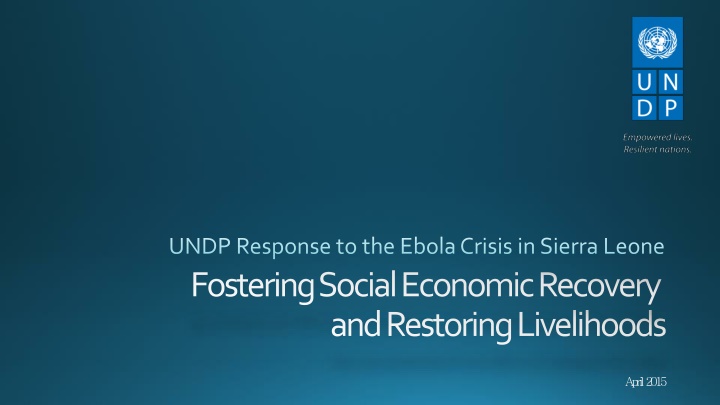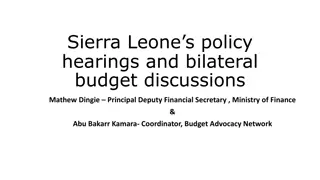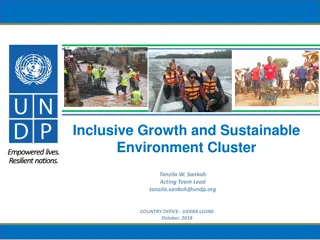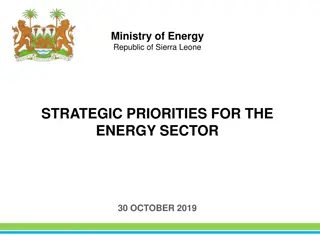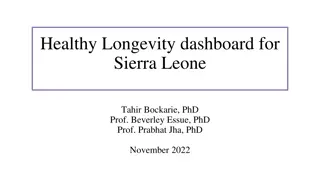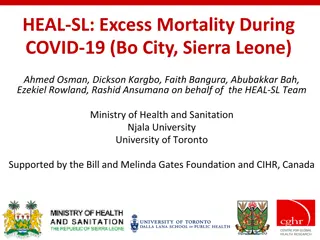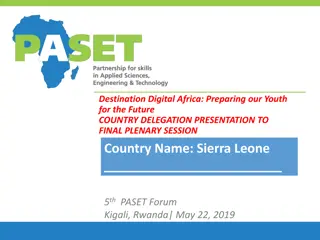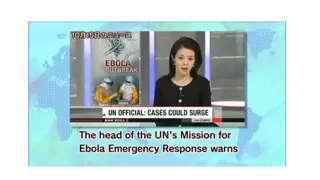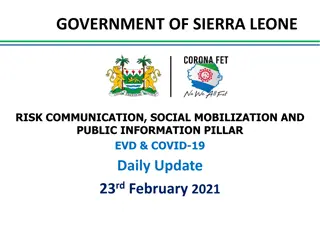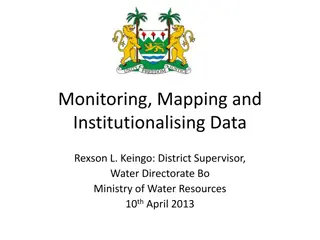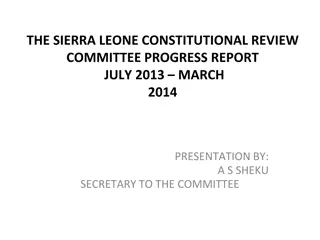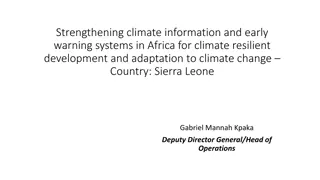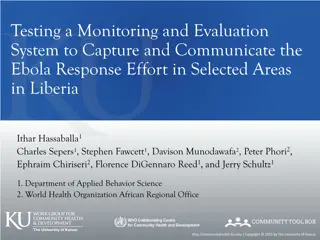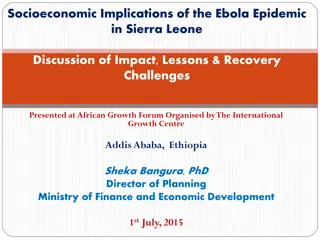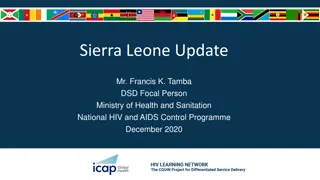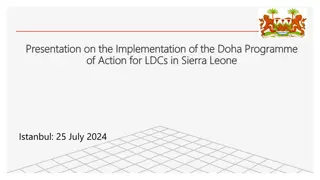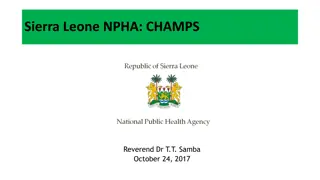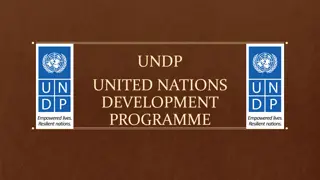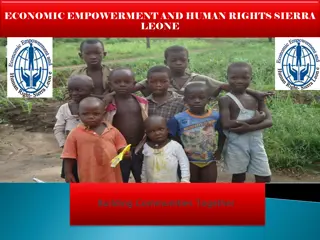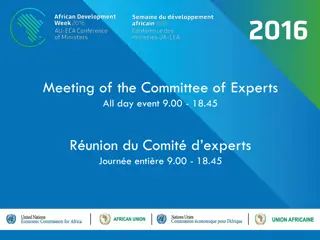UNDP Response to the Ebola Crisis in Sierra Leone - Fostering Social Economic Recovery
The UNDP responded to the Ebola crisis in Sierra Leone by reaching vulnerable populations with prevention messaging, supporting affected families, and implementing various recovery interventions. Key principles included decentralized programming, community engagement, and alignment with the National Recovery Strategy.
Download Presentation

Please find below an Image/Link to download the presentation.
The content on the website is provided AS IS for your information and personal use only. It may not be sold, licensed, or shared on other websites without obtaining consent from the author.If you encounter any issues during the download, it is possible that the publisher has removed the file from their server.
You are allowed to download the files provided on this website for personal or commercial use, subject to the condition that they are used lawfully. All files are the property of their respective owners.
The content on the website is provided AS IS for your information and personal use only. It may not be sold, licensed, or shared on other websites without obtaining consent from the author.
E N D
Presentation Transcript
UNDP Response to the Ebola Crisis in Sierra Leone Fostering Social Economic Recovery and Restoring Livelihoods April 2015
Immediate Ebola Response Results In August 2014, UNDP reprogrammed its interventions to join the fight against Ebola. Results so far include: Estimated 1.5 million vulnerable urban people and 220,000 remote community residents reached with Ebola prevention messaging and measures by over 1,000 community volunteers. This included 1,547 men and 995 women with disabilities More than 1,200 families at risk or affected by Ebola including survivors, bereaved and people with disabilities supported with kits comprising food and non-food items 6 Ebola treatment centres and health facilities provided with bio- hazard waste management systems Supported the National Ebola Response Centre to make regular and timely hazard payments to over 25,000 Ebola response workers
More results Out of 870 cases reviewed to reduce prison overcrowding, 395 incarcerated people were released from prison (ongoing) All 17 Sierra Leone detention centres provided with Ebola prevention kits and 2 Ebola observation units constructed at Freetown s main prison; male/female 2,500 security providers trained and equipped on standard operating procedures on quarantined areas and homes, roadblocks, and safe burials One-hour radio programme on Ebola aired every evening Socio-economic impact assessment reports prepared and informed national budget and recovery programming for 2015
Principles of Engagement Key principles underpin the implementation, monitoring and evaluation of UNDP s Ebola recovery interventions Decentralized recoveryprogramming Area-based approaches Communityengagement andsocial mobilization Target the most vulnerable building on response partnerships Sub-regionalpartnerships andcoordination National ownership Human-rights-based approach Participation andinclusiveness Transparency andaccountability Donoharm/conflict-sensitive approach Alignment with National RecoveryStrategy
UNDP Recovery Programme Approach, Objectives and Key Components Until zero EVD case in Sierra Leone, UNDP is contributing to the Stop and Treat priority objective. Concurrently, UNDP has already initiated recovery interventions in districts that have not had any new EVD cases for many weeks. The UNDP Recovery Programme articulates seven components aiming at the following objectives: Component 1: Policy and Recovery Advisory and Coordination Support to the GoSL Component 2: Resilient Governance and Service Delivery Support Component 3: Livelihood and Enterprise Recovery Support Component 4: Health Sector Strengthening Component 5:Crisis Prevention and Disaster Risk Management Component 6:Cash Transfer Support Component 7: Ensuring Peace Preservation Objectives to restore livelihoods and foster socio economic recovery for those most affected by the Ebola Virus Disease (EVD), to strengthen the Government s capacity to restore essential service delivery, to ensure rapid return to sustainable development trajectory while preserving and promoting peace, stability and social cohesion.
UNDP Recovery Programme Policy and Recovery Advisory and Coordination Support to the GoSL Issue: How to ensure Sector Coordination and Aid Effectiveness for the design and implementation of a cohesive, focused, relevant, achievable and well-informed national recovery plan? UNDP, as directed by the UN Secretary- General, will lead the UN Ebola-related recovery and ensure it aligns with the national strategy every step of the way. Activity Plan Policy and Technical Advisory support Coordination support and transitioning from recovery to the Agenda for Prosperity
UNDP Recovery Programme Resilient Governance and Service Delivery Support Issue: The crisis exposed the vulnerabilities of public service delivery and governance institutions, particularly in health, education, security and judiciary systems Activity Plan Building resilient governance and social service delivery systems Promote and enable transparency in decentralized planning and budgeting State citizen compact enabled and quality assurance and standard setting for select basic services
UNDP Recovery Programme Economic Opportunities and Livelihoods Issue: Ebola ravaged the Sierra Leone economy and workforce. Industry shattered, investors shied away, borders shut and jobs both informal and formal were lost. The gross domestic product (GDP) tumbled reversing impressive growth over the last few years. The hardest hit were the most vulnerable hovering at and below the poverty line. Activity Plan Social protection and safety-net for the most vulnerable enhanced Sustainable livelihoods and economic recovery of prioritized groups supported Micro and small enterprises supported
UNDP Recovery Programme Health Sector Strengthening Issue: EVD exposed the fragility of public health surveillance, prevention and response revealing the inadequacy and lack of resilience of infection prevention and control, HIV treatment and eroded public trust and confidence in the state systems. Activity Plan Governance of health systems strengthened Safe and healthy work settings enhanced for patients and health workers Availability of quality health workforce enhanced Delivery of basic and essential health services reinstated Community trust in the health sector restored Information and surveillance
UNDP Recovery Programme Crisis Prevention and Disaster Risk Management Issue: EVD exposed weaknesses in the disaster preparedness and response capacity in Sierra Leone. How to retain and maximize the capacity investments already made in the newly created National Ebola Response Centre? Activity Plan Ebola response-related capacity investments retained and enhanced for improved disaster risk management and response to future crises Dependency on bush meat as a key source of protein is reduced Future risks of exposure to EVD through contact with wildlife are reduced
UNDP Recovery Programme Cash Transfer Support Issue: How to capitalize on the Ebola Response Workers hazard payment transfer platform and mechanism developed at NERC to support EVD recovery social protection and livelihood support schemes and improve governmental institutions, particularly in areas of human resources management and payroll systems? Activity Plan Governance and harmonization recovery cash transfers are improved Cash transfer programmes are shifted to financially- inclusive social protection payment systems ERW hazard payment Database is utilized for the MoHS payroll
UNDP Recovery Programme Ensuring Peace Preservation Issue: Activity Plan Capacity of key security and justice agencies strengthened to delivery their mandates Cooperation and trust between security agencies and communities is strengthened Sexual and gender-based violence is reduced Capacity of justice sector providers enhanced to effectively respond to Ebola outbreak GoSL s capacity to prevent and resolve conflicts strengthened Access to reliable, unbiased and real-time information through radio broadcasting improved National catharsis, reconciliation and social cohesion enhanced The 2012 Fragility Assessment revealed that latent drivers of conflict remain which have been exacerbated by the hardship during the crisis
